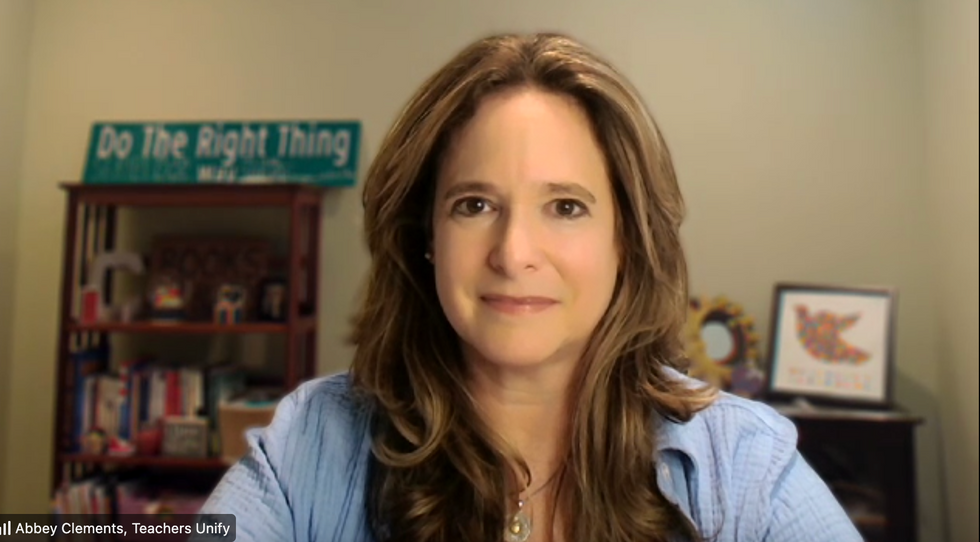The mass shooting at a Catholic school in Minneapolis on Wednesday in which two children were killed and 17 people injured was simply yet another product of too-lax gun laws, said a teacher who survived the Sandy Hook Elementary School shooting nearly 13 years ago.
Abbey Clements, now executive director of Teachers Unify to End Gun Violence, spoke to Raw Story the day after a 23-year-old shooter fired into the church at Annunciation Catholic School in Minneapolis.
The children at the Pre-K-through-eighth-grade school were attending mass.
“Every other country has folks who have mental health issues. Every country has issues that we have,” Clements said.
“We just allow easy access to firearms and ammunition, and that's why we have this problem.”
On Dec. 14, 2012, Clements was a second grade teacher at Sandy Hook Elementary School when a gunman killed 20 children and six adults. Shootings like Tuesday's remind Clements of “just the level of horror and tragedy and what it does to a community,” she said.
 Screen grab of Abbey Clements interview with Raw Story via Zoom
Screen grab of Abbey Clements interview with Raw Story via Zoom
“It comes over like a wave,” Clements said.
“It's very visceral for me. It's like 13 years, but it was five minutes ago.”
Wednesday’s mass shooting was far from the first in 2025. Forty-four school shootings have occurred in the United States this year, killing 18 people and injuring at least 74, according to CNN.
“We can't wait around for any kind of federal change,” Clements said.
“What we're calling for is a seat at the table when it comes to local, district, state policies, protocols. We know our kids. We know what's best for kids, and there are things that we could be doing.”
Teachers Unify to End Gun Violence has nearly 30,000 members, including school shooting survivors, retired teachers, administrators and advocates.
One action the group is pushing for is for schools to distribute educational materials, ideally at least three times per year, about safely securing firearms in the home.
“We have allowed this issue to become partisan,” Clements said.
“It's not a political issue. It's a public health crisis. We as educators have a place in this fight.”
‘Brace ourselves’
The Minneapolis shooter, Robin Westman, was armed with a rifle, shotgun and pistol, purchased lawfully, and died at the scene by a self-inflicted gunshot wound.
A name change application for a Robert Westman, with the same birthday as Robin Westman, was filed in 2020, explaining Westman "identifies as a female and wants her name to reflect that identification,” outlets including ABC News reported.
Shortly after shots were fired through the windows of the church at Annunciation, prominent conservatives such as Rep. Marjorie Taylor Greene (R-GA) began to push anti-trans messaging.
Secretary of Homeland Security Kristi Noem and FBI Director Kash Patel both said Westman was male.
We have confirmation that the shooter at Annunciation Catholic School in Minneapolis, MN was a 23 year-old man, claiming to be transgender.
This deranged monster targeted our most vulnerable: young children praying in their first morning Mass of the school year. This deeply sick…
— Secretary Kristi Noem (@Sec_Noem) August 27, 2025
Clements said: “In this movement, we brace ourselves for the details because we know that the other side will hang on to anything — I say on the other side, it doesn't even make any sense.
“This is about saving lives. It's about children living, and people being able to go [to the] grocery store and to the movies and to a concert without getting killed — we brace ourselves to hear these details because we know that that's going to fall prey to whatever theory that they're going to concoct to blame.”
Right-wing commentators have falsely claimed a rise in transgender mass shooters, particularly after 28-year-old Audrey Hale opened fire at The Covenant School in Nashville in March 2023, killing three teachers and three 9-year-olds.
A police spokesperson told ABC at the time Hale was assigned female at birth and used he/him pronouns.
Clements said the fundamental problem was that it is “too easy to get a gun and too easy to get ammunition.”
“The [Minneapolis] shooter left a footprint of trouble, of crisis, and there are people who saw that, and there are things that could have been done,” Clements said.
‘Just horrible’
When news of the shooting in Minneapolis broke, Clements said she received a text from one of her students who survived the Sandy Hook shooting and is now in her 20s.
“They're forever changed, and it's not fair,” Clements said.
Clements recalled the day of the shooting.
Shortly after she entered her classroom following a check-in with Principal Dawn Hochsprung, Clements said, she heard “what sounded like metal folding chairs falling.”
She said she pulled two kids into her classroom.
“We huddled into the coats that were hanging on the side of the wall and listened to 154 shots blaring through the loudspeaker. I knew that this was traumatizing for them," Clements said.
“I wish I could protect them from the sound, and I tried to distract them. I sang songs to them and read books to them, but it was a long five minutes.”
Clements remembers a knock at the classroom door and eventually leading the kids to a firehouse where they were reunited with their parents, which was “just pure hell,” she said.
“It's difficult for me to talk about that because it was just rumors, and you’re starting to realize what's happening, and parents picking up their kids, and people couldn't find theirs, and it was just horrible,” Clements said.
Hochsprung was one of the 26 people killed.
Clements returned to teaching her students at an empty intermediate school nearby.
“I did that with kids who were traumatized,” she said. “We ran out of a building together, and they lost friends.
“I didn't want anybody to leave, go anywhere by themselves, so I would take everybody to the bathroom with me if anybody had to go.”
Following the Sandy Hook shooting, Clements said, she reached out to teachers who survived the shooting at Columbine High School in April 1999. There, two 12th-graders murdered 13 students and one teacher before killing themselves.
Those survivors told her the Sandy Hook shooting would stick with her “forever,” and the trauma would be “lifelong.”
“One of them said to me, ‘You'll think about it every day,’” Clements said.
To teachers, students and others traumatized by the Minneapolis mass shooting, Clements said: “I think what I would say is that I'm so, so sorry and that you are not alone, that there is a community of us out there, here to offer support in any way we can.”

 Raw Story
Raw Story
 New York Post
New York Post America News
America News Local News in Ohio
Local News in Ohio ABC30 Fresno World
ABC30 Fresno World Reuters US Top
Reuters US Top Associated Press US News
Associated Press US News The Hollywood Gossip
The Hollywood Gossip